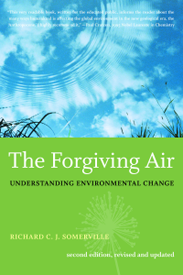The Forgiving Air
Latest News
Over the decades, AMS has championed the publication of unique textbooks and literature for the weather, water, and climate community, including enthusiasts. While AMS does not routinely accept book proposals, it has many books of lasting record--biographies, histories, guides, and textbooks--on offer through this bookstore as well as through the University of Chicago Press.
Shopping cart
There are no products in your shopping cart.
| 0 Items | $0.00 |
Information About:
The Forgiving Air
To see member pricing above, members should log in to the AMS Bookstore
Title information
It might be a great comfort to us all if our planet and its climate were constant and unchangeable. They are not. They have been changing naturally for as long as the Earth has existed. Now, nearly seven billion people are collectively such a potent force that their influence on the global environment has begun to rival that of Mother Nature. Scientist Richard C. J.It might be a great comfort to us all if our planet and its climate were constant and unchangeable. They are not. They have been changing naturally for as long as the Earth has existed. Now, nearly seven billion people are collectively such a potent force that their influence on the global environment has begun to rival that of Mother Nature. Scientist Richard C. J. Somerville is a Distinguished Professor Emeritus at Scripps Institution of Oceanography, University of California, San Diego, and one of the authors of the most recent Intergovernmental Panel on Climate Change (IPCC) report. The 2007 Nobel Peace Prize was awarded in equal shares to the IPCC and Al Gore for bringing the science behind global change to the world. In The Forgiving Air, Somerville weaves those critical findings into a more accessible story, making the most important issues of our time understandable to all.
Chapter 1. Introduction
Chapter 2. The Ozone Hole
Chapter 3. The Greenhouse Effect
Chapter 4. Computing Weather and Climate
Chapter 5. Reacting to Climate Change
Chapter 6. Global-Change Causes and Remedies
Chapter 7. Air Pollution and Acid Rain
Chapter 8. The Future of Planet Earth
Richard C. J. Somerville
Richard C. J. Somerville is Distinguished Professor Emeritus at Scripps Institution of Oceanography, University of California, San Diego. He received a B.S. in meteorology from Pennsylvania State University in 1961 and a Ph.D. in meteorology from New York University in 1966. He joined Scripps as a professor in 1979. Dr. Somerville is a theoretical meteorologist and is interested in all aspects of climate science and climate policy. His primary research focus is on the role of clouds in the climate system. He comments frequently on climate and environmental issues for the media, and has also testified before the United States Congress, briefed United Nations climate change negotiators, and advised government agencies. Dr. Somerville has received many awards and honors for both research and outreach. He has been elected a Fellow of both the American Association for the Advancement of Science and the American Meteorological Society. In recent years, Dr. Somerville was a Coordinating Lead Author in Working Group One for the Fourth Assessment Report of the Intergovernmental Panel on Climate Change (IPCC). This report, published in 2007 by Cambridge University Press and available for download at http://www.ipcc.ch, is the definitive summary of the state of climate science.
Review of The Forgiving Air
Disaster Prevention and Management
This readable, entertaining guide for the educated layperson covers all things atmospheric, from the ozone hole to acid rain to topics such as climate change, smog, and sulfates. Somerville finds reason for optimism in the way that the issue of the “ozone hole” has been dealt with. “In the case of stratospheric ozone”, he writes, “the problem was quickly recognized, and decisive action did eventually occur”. Although that approach offers hope for dealing with pressing problems of the future, Somerville warns that we will “be concerned with determining which actions are wise and prudent, given incomplete scientific information.” “In some cases, there may still be time enough to act to avoid serious planetary change.”

